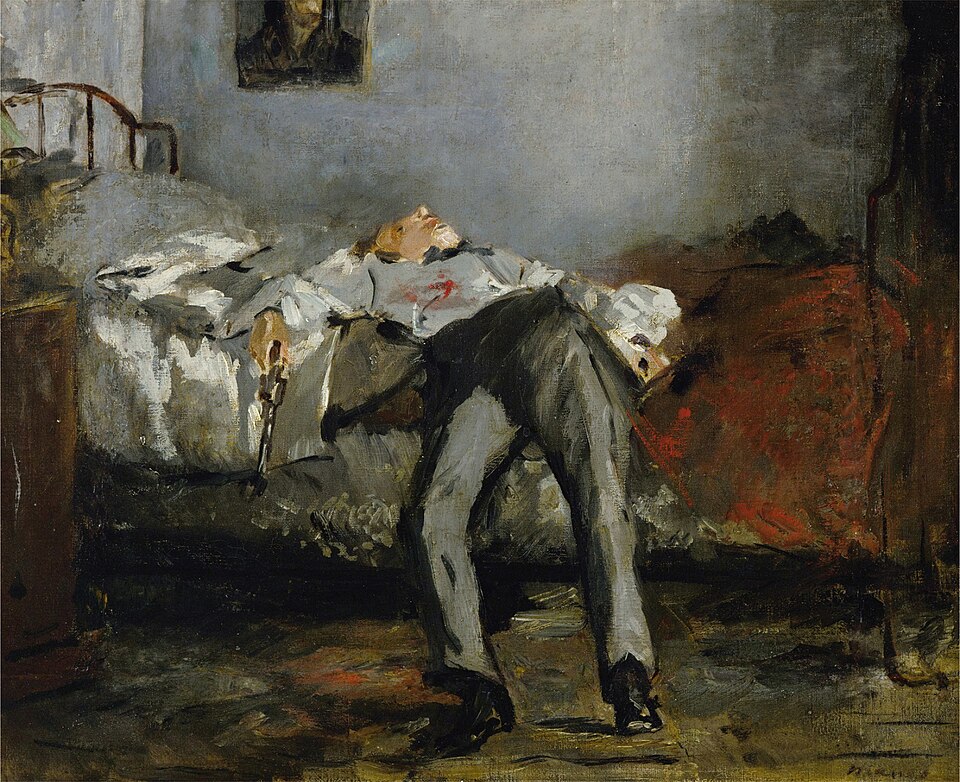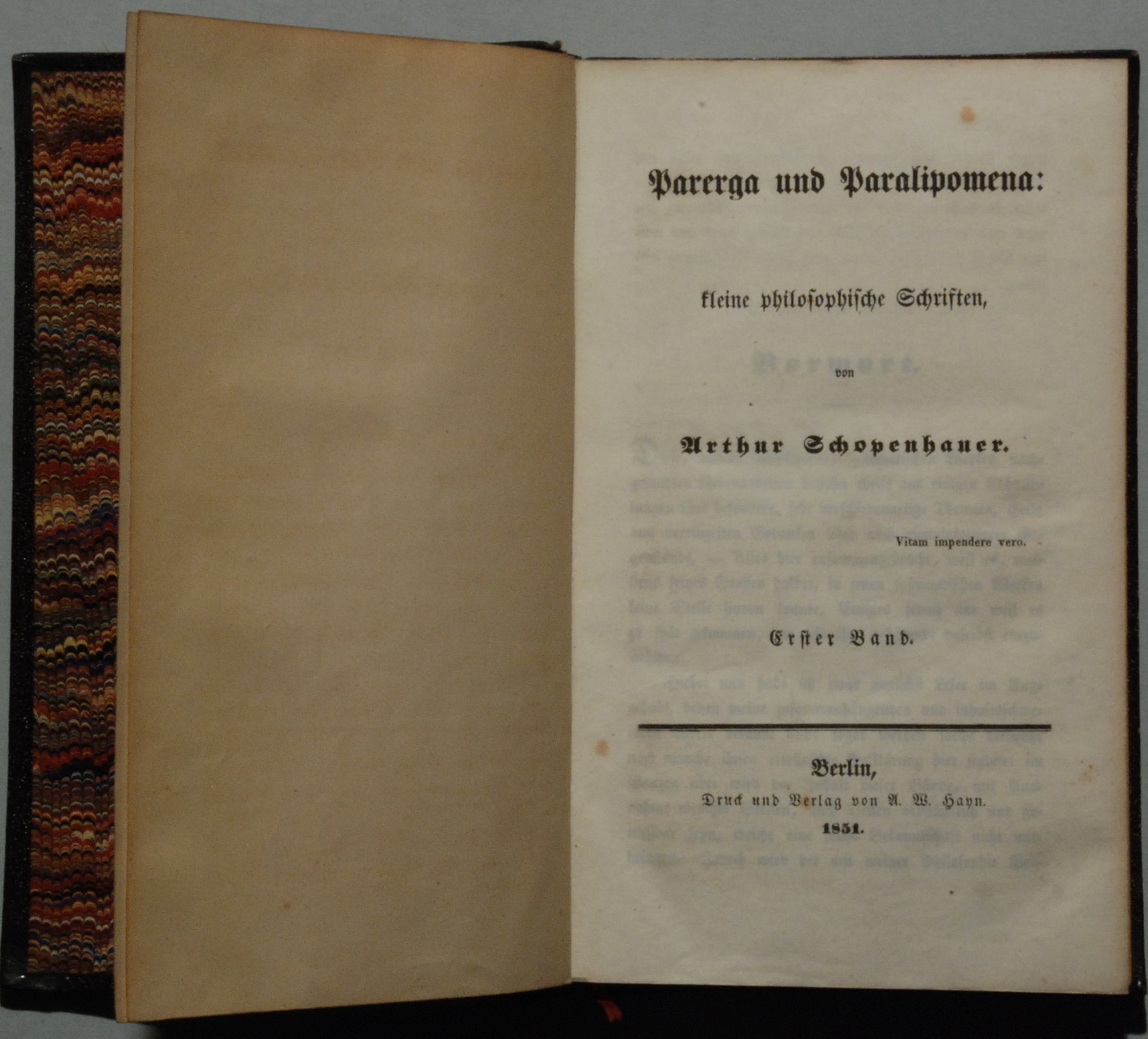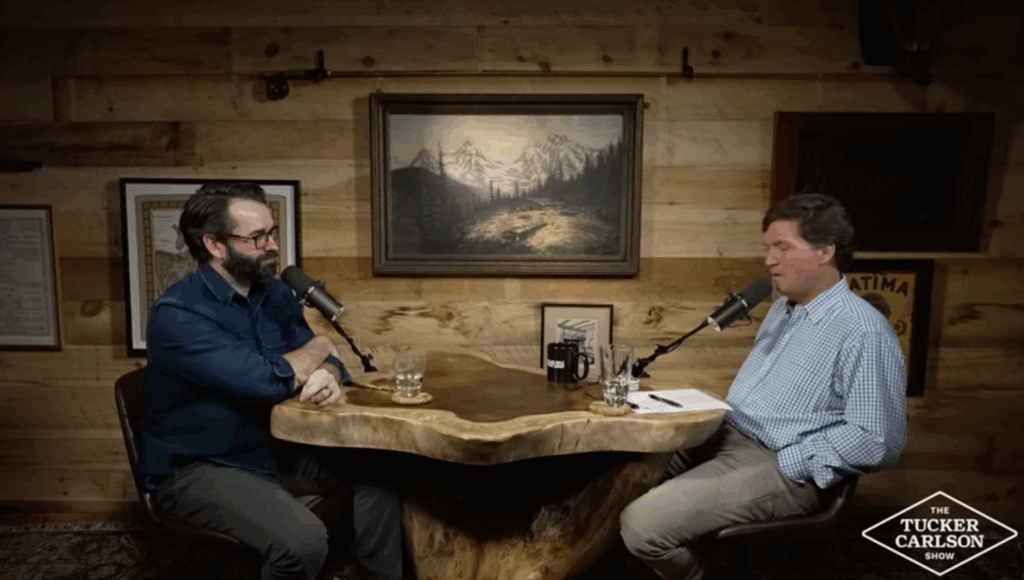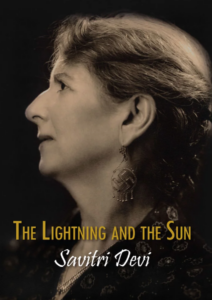“During the thousand years before you, your blood was purely preserved, so that you would be who you are. Now you must preserve your blood, so that all of the generations of the next thousand years will honour you and thank you.”
César,
by Gaedhal
I am not a Randian Libertarian, but one thing that she got right is that we are at home upon the earth. The Orthodox anchorite is not at home upon the earth, which is why he is climbing a ladder to “Heaven” to escape it. Take a look at some of these Orthodox icons. They can be really trippy:
The earth is presented as a sterile desert… because Christianity was, originally, a desert religion.
As we discussed on your blog, César, there is probably a Schopenhauerian, Pessimistic, Benetarian, Antinatalist, EFIL-ist interpretation to these icons: better to have never been, and second best is to deny the will to live, and to annihilate oneself, through ascesis and chastity/celibacy, so as not to burden another generation with the “pain and boredom” of life, as pessimists put it. As Jesus himself said: let he who can take castration, take it. One of the things that Antinatalists often do is get vasectomies. Richard Carrier has gotten a vasectomy, which is why I suspect his being an Antinatalist.
In my view, “Jesus”, is merely Nirvana, the “breathed-out state”, as Alan Watts put it, i.e. the “all-sufficient void” as Schopenhauer put it. It is conjectured by the likes of Richard Carrier that there was an adept Christianity, that is now lost to us, wherein the obviously fictional life of Jesus was understood as a parable. The Christian adepts understood that deceased Jewish carpenters do not respawn and float off into the sky. Dominic Crossan, my fellow Ulsterman from the lost county of Donegal, also believed that Jesus’s entire life, as recounted by the gospels, and especially the original gospel, the gospel of Mark, is a parable.
But a parable for what? Who knows? But given that we know that there were Antinatalist Buddhist preachers/missionaries in the Levant, since around 100 BCE—see mythicist papers for more on this—perhaps Christianity is a parable for the various forms of Pessimism, listed above.
If John of Patmos had an IQ north of 80, then he too would have understood that Jesus’s life was a parable. Again, virgins don’t give birth, and dead Jewish carpenters never respawn and levitate into the sky… there are no exceptions to this. I am putting money on the fact that the Jewish con-artists who wrote the New Testament understood this as well. Thus, the true end to the Book of Revelation would be the earth melting in fervent heat—as pseudo-Peter sayeth in an epistle—and the sky being rolled up as a scroll. The sky was a physical thing in those days, preventing the primordial waters from drowning us all. Thus, the Revelation is an EFIL-ist parable where the ideal state is the destruction of the planet. Revelation is a 2nd-Century C.E. version of the Red-button EFIL-ist thought experiment. The “New Heavens and the New Earth” is merely for the non-adepts, for the profane.
As Schopenhauer says: he is practising true Christianity, and in my view it could actually be the original version of Christianity.
And here is the website where Salm explores the link, perhaps direct, between Buddhism and Christianity. We know that there were Buddhist proselytizers from India in the region, at about the turn of the era, in about 1 CE.
However, it could just be a case of independent convergence. This is a hell-planet where living things must kill and eat other living things to survive. This is the Darwinian problem of evil [emphasis added by Ed.]. No sensible or ethical god would have created a system like this. This is why I view “theistic evolution”, such as that promoted by Biologos, to be every bit as delusional as creationism. To me, Pete Enns is every bit as delusional as Ken Ham. Once we introduce gods to evolution, then it becomes intelligent design. Theistic Evolution is an oxymoron to me.
Given that this is a hell planet for most sentient beings, then the thought often independently arises that it were better to have never been. The Jesus movement need not have had a formal connection to Buddhism to come up with Pessimism and Antinatalism—let he who can receive [castration] receive it—on their own.
Responding
to Robert

Le Suicidé by Manet (ca. 1877-1891).
This morning, Robert commented on this site. I empathise with him because I feel the same way: Kali Yuga is killing the spirit of noble men, while all we see around us is racial betrayal and the cult of ugliness (the antithesis of the benign world in Germany glimpsed in the Beethoven film I recently promoted). Since I, too, especially in the mornings when I wake up, find myself in a state of anxious despair that eats away at my soul, I understand Robert.
But we know the medicine.
Robert: Have you read the featured article carefully?
The solution to our dilemma lies in forming a brotherhood of the sacred words. That obviously implies that some of us priests live together. I find it pathological that we live so far apart. If we lived together, it would be very easy to plan the content of the next podcast: it would be a daily show, almost every day of the year, in which two or three priests would sit around a round table to discuss current affairs (I mentioned something about this in my post on 17 December).
Precisely because that podcast would show how folk like Nick Fuentes are stuck in the middle of the Rubicon, with us talking on solid ground on the other side of the river, it would be the most radical audio-visual podcast of all the racialist forums, without comparison!
I don’t know if you’ve read my article on depression. Depression is hatred/anger repressed due to the norms of stupid society, whether it be to comply with the fourth Judeo-Christian commandment, or in our case, because we are atomised due to the idiotic behaviour of “white nationalists” who don’t live under the same roof to create the proper Männerbund.
But simply living together wouldn’t be enough to cure us of depression. What cures us is open, inflammatory, blatant and public genocidal hatred: what we would do daily in the podcasts!
Of course, that would be unnecessary if there were already a revolution, at least in a Western country: we would simply go there to fight, even if we died in the fray. But there is no revolution because all Aryan men, including white nationalists, share ethnosuicidal Christian ethics (as we saw recently when discussing Richard Spencer’s recent interview with Fuentes).
It is Christian ethics that we must first break down so that Aryan men dare to do something substantial in the real world (although, for the moment, only at the podcast level). Being atomised will only continue to destroy our spirit. Alas, some make these podcasts in the wrong country, like our friends Joseph Walsh and Chris Gibbons, who are serving years in prison in the UK due to their Black Wolf Radio.
If Europeans took their priestly vows (cf. the featured article once again), they could come to a country where it would be possible to have an audio-visual equivalent of Black Wolf Radio without running afoul of European, Canadian or Australian laws, whose governments seem intent on eradicating white populations (that also happens in the US, but at least they have the First Amendment there).
While you take your vows, as I suggested today, read William Pierce’s novel. It will immediately lift you out of your depression. But it will return after a day when you finish it, because there are no men like that in the West. Racialists are all like those women I was talking about recently (the refugee ladies during the Battle of Blackwater). They are so feminised that they are waiting for a hero on a white horse to come and rescue them, instead of being that hero themselves.
This sheds light on my post about the Eroica Symphony and why it made me cry: those were times when the ideals of the French Revolution inspired Beethoven, although, as we see in the film, he later tore up the page, very angry, on which he dedicated the symphony to Napoleon when he crowned himself emperor.
Understanding that music and getting out of depression are two sides of the same coin (Beethoven himself harboured suicidal ideation before composing the Eroica). Regarding us, only by living together will it be possible to have a kind of Spartan Syssitia that lifts our spirits. (The alternative is becoming prey to the noonday demons and ending up like the guy in Manet’s painting.)
Pessimism

Parerga and Paralipomena, German original edition, 1851.
The day before yesterday I quoted a passage from Schopenhauer’s most readable book. This Christmas I would like to respond to what Gaedhal told me today. He says that the bourgeoisie leads to antinatalism and pessimism, and so does Christianity:
My task is to obliterate those forces that ruin the joy of life. The abusiveness of Christianity, of “our parents’ religion”, as you put it, is one of these malevolent joy-disrupting forces. This is where the Thanatos impulse comes from.
I believe the latter is the main factor, even more so than the bourgeois way of life. Let’s quote, for example, other paragraphs from Schopenhauer’s book, this time from the chapter “On Affirmation and Denial of the Will to Live”:
Between the ethics of the Greeks and the ethics of the Hindus, there is a glaring contrast. In the one case (with the exception, it must be confessed, of Plato), the object of ethics is to enable a man to lead a happy life; in the other, it is to free and redeem him from life altogether—as is directly stated in the very first words of the Sankhya Karika.
Allied with this is the contrast between the Greek and the Christian idea of death. It is strikingly presented in a visible form on a fine antique sarcophagus in the gallery of Florence, which exhibits, in relief, the whole series of ceremonies attending a wedding in ancient times, from the formal offer to the evening when Hymen’s torch lights the happy couple home.
Compare with that the Christian coffin, draped in mournful black and surmounted with a crucifix! How much significance there is in these two ways of finding comfort in death. They are opposed to each other, but each is right. The one points to the affirmation of the will to live, which remains sure of life for all time, however rapidly its forms may change. The other, in the symbol of suffering and death, points to the denial of the will to live, to redemption from this world, the domain of death and devil. And in the question between the affirmation and the denial of the will to live, Christianity is in the last resort right.
The contrast which the New Testament presents when compared with the Old, according to the ecclesiastical view of the matter, is just that existing between my ethical system and the moral philosophy of Europe.
The Old Testament represents man as under the dominion of Law, in which, however, there is no redemption. The New Testament declares Law to have failed, frees man from its dominion, and in its stead preaches the kingdom of grace, to be won by faith, love of neighbour and entire sacrifice of self [emphasis added]. This is the path of redemption from the evil of the world. The spirit of the New Testament is undoubtedly asceticism, however your protestants and rationalists may twist it to suit their purpose.
Asceticism is the denial of the will to live; and the transition from the Old Testament to the New, from the dominion of Law to that of Faith, from justification by works to redemption through the Mediator, from the domain of sin and death to eternal life in Christ, means, when taken in its real sense, the transition from the merely moral virtues to the denial of the will to live.
My philosophy shows the physical foundation of justice and the love of mankind, and points to the goal to which these virtues necessarily lead, if they are practised in perfection. At the same time it is candid in confessing that a man must turn his back upon the world, and that the denial of the will to live is the way of redemption. It is therefore really at one with the spirit of the New Testament, whilst all other systems are couched in the spirit of the Old; that is to say, theoretically as well as practically, their result is Judaism—mere despotic theism.
In this sense, then, my doctrine might be called the only true Christian philosophy—however paradoxical a statement this may seem to people who take superficial views instead of penetrating to the heart of the matter.
The heart of the matter is Xtian ethics! It is striking that, despite not being a Christian, Schopenhauer shared such Christian principles. This is what makes him, in our eyes, a “secular Christian” (what Gaedhal calls a hyper-Christian atheist).
The fact that this secular philosopher made such concessions to the religion of his parents would prompt the next great German philosopher, Nietzsche, to delve into the root of the matter. Among other neochristians, Nietzsche criticised Schopenhauer, whom he had admired in his early youth.
Unhistorical
It’s very, very rare for a movie to make me cry, but at midnight I cried while watching this film about the premiere of the Eroica:
Of course, this BBC production is dramatised: the musicians play the symphony that revolutionised European music at first sight of the score (in the real world, among the musicians I have known, only the German émigré to Mexico, Gerhart Münch, could play a score at first sight on the piano). BBC dramatisation aside, one of the YouTube commenters said:
I feel sorry for the vast majority of the youth today who will likely never come to know, love and appreciate the colossal genius of not only Beethoven, but most of the great composers.
I feel exactly the same way. In fact, this very year I visited the site of the premiere of Beethoven’s Third Symphony and took this photo. To understand why the film moved me, here is what I wrote in the final book of my autobiography, Lágrimas (Tears), about an experience in my adolescence (at that time I had a turntable in my bedroom):
When I heard the Eroica Symphony, from the very first bars I realised that I was listening to truly extraordinary music of the highest quality! The great power of the Allegro con Brio was a complete surprise, as well as a watershed moment in the development of my spirit; and the cover of my father’s record, showing Michelangelo’s Moses in my bedroom in Palenque Street, couldn’t have been more apt.
I had discovered Beethoven—another dimension in music! But in those days I also had my first confrontation with the anti-artistic ways of the film industry.
The last sentence refers to the deep disappointments I faced even then, in my early teens, when I realised that Hollywood didn’t always have art as its ultimate goal.
To understand Hitler and National Socialism the new generations must know, love and appreciate the colossal genius of the great composers. I had it easy because both my parents were professional musicians (my father’s last work for a large orchestra was premiered posthumously on 25 February 2018, at the Palacio de Bellas Artes).
If anyone understands what we have been calling psychogenesis, banning degenerate music—as the Third Reich did—and educating Aryan children with classical music, is as important as prohibiting sexual dissipation among adolescents and young women.
Schopen quote
If you imagine, in so far as it is approximately possible, the sum total of distress, pain and suffering of every kind which the sun shines upon in its course, you will have to admit it would have been much better if the sun had been able to call up the phenomenon of life as little on the earth as on the moon; and if, here as there, the surface were still in a crystalline condition. [Schopenhauer, Essays and Aphorisms, page 479]
Schopenhauer lived in a time when it wasn’t yet known that, in the distant future, our sun will become a Red Giant: eliminating not only what we call unnecessary suffering, but also the necessary suffering that every creature that wants to live must endure.
As far as the commenters on this site are concerned, only Benjamin, Gaedhal, and I have rationally ventured into the subject of Schopenhauer’s pessimism. I don’t count Autisticus Spasticus because he suggests getting rid of a hundred per cent of humanity at once.
In contrast, I hope that only the Aryan race, in its Nordic version, will persist in the future and that some super-beautiful Nordids (I recently learned that actor Björn Andrésen from Death in Venice passed away this year) will become followers of the religion of the four words, and inhabit the paradise of girls on rocks painted by the American Maxfield Parrish. Spasticus’ solution isn’t rational because it would allow, say, killer whales to continue tormenting whale calves of other species once Homo sapiens became extinct. Instead, the priest of the sacred words suggests exterminating the killer whale gangs that are doing this.
With its trillions of galaxies, the universe is the mystery of mysteries. What seems to reign everywhere in the Milky Way is precisely this “crystalline condition”, to rephrase Schopenhauer, of the planets of all stars, except our own. Trying to conquer the universe for our religion seems impossible.
But modestly speaking, it is theoretically possible to try to implement the sacred words—Eliminad todo sufrimiento innecesario—at least on this planet. And for that, we need Hitlerites like Ben and me (remember that the first thing the Nazis did when they came to power was to ban vivisection).
Tort
vs. Walsh & Tucker
I can use this segment from Tucker Carlson’s recent interview with Matt Walsh (both Christians) to show what the priest of the sacred words—an anti-Christian admirer of Nazi paganism—has in common with American conservatives. Let’s consider the values that, according to Walsh, those who share them are essentially on his side. According to Walsh, the first value is:
1) Objective truth
Here we seem to be in complete agreement.
But as commenter Gaedhal has said, when it comes to approaching the New Testament from the standpoint of objective truth, conservative Christians are more primitive than liberal Christians. Quite a few of the latter are aware of the historiographical problems that have been raised for centuries about 1st century Christian writings. In contrast, people like Walsh, Tucker, and racialist Christians generally ignore the issue, although it is evident that there is an objective truth regarding the historicity of the New Testament stories. If you ignore it, you are basically ignoring this first value.
If all these conservatives educated themselves honestly on the subject, they would realise that there is not even evidence for the existence of Jesus, and the same could be said about the existence of the Jewish god, whom both Walsh and Tucker worship.
Curiously, both recognise that everything stems from there: from objective truth. But if this pair and the Christians of the racial right don’t even dare to discuss the issue, we can assume that when it comes to Judeo-Christianity, they are not interested in such a thing as objective truth.
The next thing Walsh mentions is:
2) Preserving American identity in particular: the institution of the family (and therefore the institution of marriage), and Western civilisation in general.
Note that not for a second do these two Christians talk about preserving the white race, which is what the priest would mention as the priority. It is from the 14 words that one understands the need for the institution of marriage[1], which only makes sense if both husband and wife are whites. To the conservative question of what we are trying to conserve, my answer would be: the DNA of the Aryans.
It is precisely because of this omission that Walsh and Tucker later criticise multi-culturalism. The religion of this pair doesn’t allow them to criticise the multi-racial society that the US has become. (When an Aryan marries a coloured, for the priest of the sacred words s/he sins against the holy spirit of life.)
_________
[1] Remember that my favourite films are Sense & Sensibility (1995), and Pride & Prejudice (2005).
The Lightning
and the Sun, 13
Early marriages of joyfully consented racial selection, to raise sexual relations […] had one aim and one alone: to breed, out of the best Germans, a nation of supermen in the Nietzschean sense of the word; a nation of ‘heroes like unto the gods,’ to repeat the words of Homer.
And, as I said before, the Führer pursued that aim not just because the Germans were his people, but because his, more-than-political, nay, more-than-human insight pointed them out to him as the only people sufficiently pure-blooded and, at the same time, sufficiently militant to be the saviours of the Aryan race, here and now, in its present-day emergency, and to become the instruments of its regeneration and survival, beyond the stormy end of our Time-cycle.
The well-known National Socialist policy of German expansion towards the East is the logical consequence of Adolf Hitler’s efforts to raise not only the biological quality of his people (through racial selection) but also their birth-rate, while doing all he could to avoid coming in conflict with England i.e., while refusing to claim, for Germany, colonies overseas. It was as clear and consistent as could possibly be: if every healthy and pure-blooded German was to have as many children as he or she could—the more the better—(and that was what the National Socialist State was urging them to do), then surely that yearly increase in population was to live somewhere and somehow. And if emigration overseas was to be discouraged (in order to avoid all economic rivalry with England, in those days in which there still existed a British Empire) then the growing millions had to find another outlet, for Germany was anyhow, and already before Adolf Hitler came to power, too small for the population she had. The new outlet was to be ‘the East’—the rich corn-lands of Ukraine, and further still: Russia’s illimited expanses.
This policy has been misunderstood […]
In order fully to understand both, one has—again—to consider National Socialism from the standpoint of cosmic evolution and to recognise, in it, the great Movement ‘against Time’ […].
[…] in order to overrun the earth with his own brood of poorer and poorer quality. That sinful will, coupled, as time goes on, with positive hatred for the eternal, natural Order, has found its latest main expression in the system of false values […]
[…] to organise the every day more enormous Menschenmaterial for the benefit of the Forces of disintegration. These, i.e., their agents, tend, admittedly to do away with the vast international slum which the world has become, but… only in order to drill the slum-dwellers—ultimately—into factory robots with one ideal: work, work, work; ‘production,’ ever more production, and cheap enjoyment—ever more enjoyment—quantity, and ever more quantity… till more and more millions of bastardised world-citizens have completely killed Nature for ‘man’s’ sake […].
In the eyes of the believers in quality, however (in the eyes of those who deplore that broadening disparity between actual life and its divine pattern, which characterises evolution in Time), any healthy tree, any perfect sample of manifested Life—is worth far more than an ugly,—degenerate human bastard. […]
That is, I repeat—one can never stress the point enough—the deep opposition between National Socialism and Marxism, nay, between National Socialism and all man-centred, equalitarian creeds, of which Marxism is merely the latest in date and the most consistent. It is the opposition between the Golden Age ideal of quality at all levels of existence, and the Dark Age dream of organised human quantity, submerging all life, until it itself finally sinks into chaos and death.
But we are, now, in the Dark Age—and, which is more, near the end of it. This is a fact which nothing can alter. And just as ‘tyranny can only be broken through greater tyranny, and terror through terror’ (Mein Kampf, p. 507), so can quantity only be crushed through quantity.
The truth which Adolf Hitler gave his people, so that they might become and remain the bulwark of Aryandom against the impact of a bastardised world drilled in Marxism (the latest Jewish revolutionary creed ‘in Time’), can be condensed in a few simple sentences: “We Germans are the only possible leaders of Western Aryandom. That is our ‘God-ordained’—Nature-ordained—mission. We are, therefore, valuable—irreplaceable. Therefore we must live; live and thrive; become numerous, at the same time as we breed an élite. Numerous at any cost (in this Age, in fact, pure-blooded quantity is the raw material out of which, here and there, quality emerges; great men are often born in large families.) Therefore, become a pure-blooded quantity; produce as many healthy Aryan babies as possible!  But we are a nation without space. And we need space for the many babies; space in order to live and fulfil our mission. We don’t want to become England’s enemies. The English are, like we, of Nordic blood (or mostly so). People of the same best blood should collaborate in view of the same lofty aim: the rule of the best of their common best blood. It is the original intention of Nature; the spirit of the eternal Order, against which we do not wish to sin. England can be (we hope) converted to this standpoint. But Russia has become the citadel of Marxism—that hated Jewish snare. It is, apart from that, a broad, rich land; can provide plenty of space for us, and all possibilities of our growing into a huge people. Huge, and of exceptional quality, therefore invincible; the lords of this earth along with our Nordic brothers, the English. Therefore: expansion towards the East—Ostpolitik!” […]
But we are a nation without space. And we need space for the many babies; space in order to live and fulfil our mission. We don’t want to become England’s enemies. The English are, like we, of Nordic blood (or mostly so). People of the same best blood should collaborate in view of the same lofty aim: the rule of the best of their common best blood. It is the original intention of Nature; the spirit of the eternal Order, against which we do not wish to sin. England can be (we hope) converted to this standpoint. But Russia has become the citadel of Marxism—that hated Jewish snare. It is, apart from that, a broad, rich land; can provide plenty of space for us, and all possibilities of our growing into a huge people. Huge, and of exceptional quality, therefore invincible; the lords of this earth along with our Nordic brothers, the English. Therefore: expansion towards the East—Ostpolitik!” […]
[…] if only England had not betrayed her own blood and deliberately started the Second World War.
The fact that all Adolf Hitler’s efforts to avoid the war—or to end it speedily and victoriously, at least honourably—remained fruitless, proves by no means his inefficiency as a statesman or as a strategist. It only proves that the forces of disintegration—the coalesced forces of our Dark Age, embodied in all-powerful international Jewry—were, in spite of his insight, in spite of his genius, too strong for him; that it needed a still harder ‘Man against Time’ than he, in order to break them; in other words, that he is not the last Man ‘against Time.’
Emsdetten in Westfalen,
Germany, 4th May, 1955.
______ 卐 ______
The Lightning & the Sun by Savitri Devi (Counter-Currents Publishing, 2014, unabridged edition) can be ordered here.
pregnant
“This account is managed by my husband and myself,” says a young Canadian woman on her X account.
I love seeing the photos she uploads because, since I follow several National Socialist males on X, it’s very refreshing to alternate Yang with yin. Healthy women come from Venus and healthy men come from Mars.
If Western women today were like this girl, many incels would already be married…!



